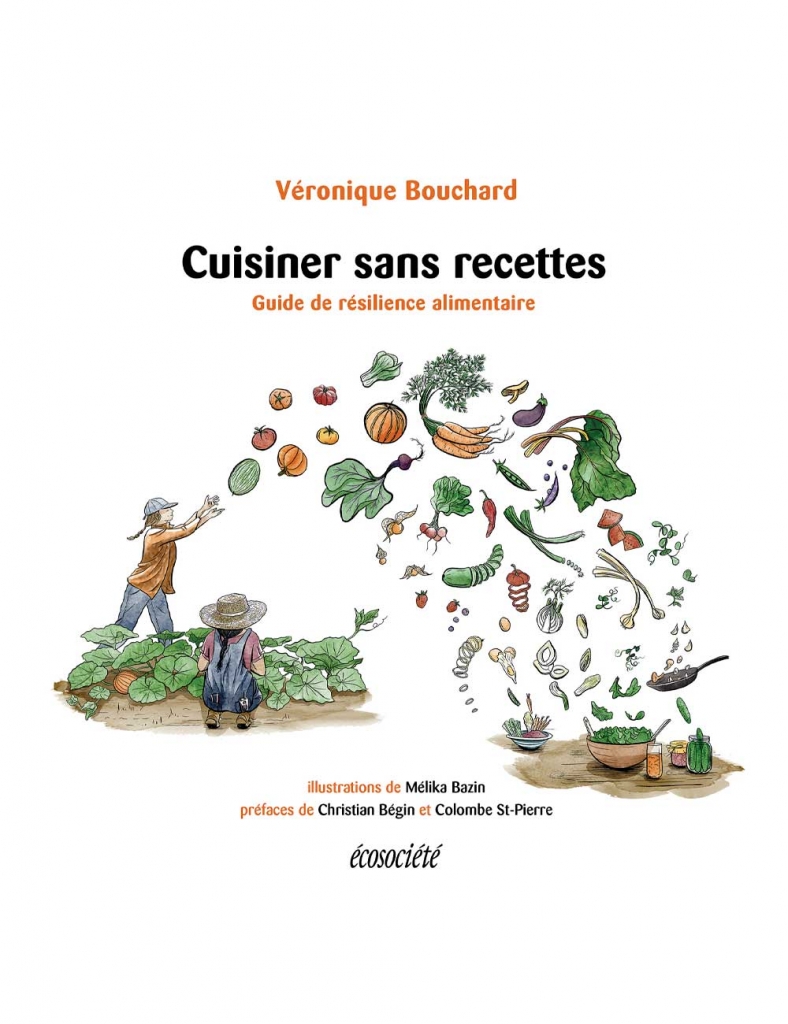Atelier
Another Way to Cook
Brush up on these five skills to make local meals on the fly and off the books.
Text—Véronique Bouchard
Illustrations—Maxime Prévost
Did you, like the rest of us, run out of certain staples during the first lockdown? You’re not alone. And by all accounts, these shortages will become more frequent in the coming years. We will have to adapt our future diets to increasingly precarious food supplies due to extreme weather events. What’s more, we need to learn to stop depending on an industrial system that exploits both the land and the people who cultivate it.
By developing our capacity to cook with what we have on hand — using the ingredient as the starting point, rather than the recipe — we can become agents of change. Starting now.
A new year is beginning. Resolutions (which are hard to keep, by definition) aside, I am suggesting you brush up on these five skills at your own pace, both for the joy of cooking and because it’s imperative we transform our food culture into something more eco-friendly, resilient, and united.

– 1 –
Critical thinking
Is it normal — or even desirable — to have constant access to food from all over the world? The reality is that this privilege, reserved for the wealthiest people, is shouldered by rural and agricultural communities who must bear the human, social, and environmental costs.
Make choices based on respect. Take an interest in the ways foods are produced. By getting as close as you can to the stewards of the earth — through public markets and organic food baskets, for example — you’ll be learning to cultivate gratitude and to recognize the true value of each product.
Be wary of marketing. Always remember that ads are designed to encourage product sales and maximize company profits. Moreover, advertising often depicts cooking as a burden we should free ourselves from by buying ready-made and ready-to-eat foods. However, these are expensive, require single-use packaging, and are rarely nutritious.
Learn to take your time again. What if you tried to steal back some of your screen time — from devices whose apps are specifically designed to be addictive — to explore, provide nourishment, and take pleasure in cooking again?

– 2 –
Curiosity
Curiosity is the driving force of learning, whether that means diversifying fridge contents or increasing understanding of basic cooking principles.
Discover the incredible diversity our region has to offer. Seaweed, wild mushrooms, lesser-known vegetables, all sorts of legumes: eating local is anything but boring! Why not challenge yourself weekly or monthly to discover a new food grown nearby? There are many helpful tools for this, including Savour Ottawa.
See the recipe as a source of information and inspiration, rather than the rule. Here’s a thought: you could compare several recipes for the same dish to understand the role of each ingredient, identify possible variations, and grasp the basic principles of making it.

– 3 –
Confidence
Confidence is one of the key ingredients for creativity in the kitchen. Try boosting it in good company!
Develop your culinary knowledge. Dive into books and articles that explain the fundamentals of cooking rather than those that just provide recipes. The more you know, the less you’ll depend on them.
Learn with others. If you never had the chance to cook alongside your parents, it’s not too late to learn from others! You can make your own bread, preserves, and sauerkraut with friends who have the skills and experience. You can also take part in communal kitchens (which have obviously had to adapt to current restrictions) or volunteer to help an artisan in your neighbourhood.

– 4 –
Creativity
Cooking is like playing music: once you’ve learned some of the basics and racked up some practice, you can feel free to start improvising.
Make substitutions. Try replacing certain ingredients in a recipe with local alternatives — sugar with maple syrup or honey, fish sauce with seaweed flakes. In the winter, swap mango or bananas in your smoothie for berries you’ve frozen ahead of time.
Take up touski. This little Québécois word is a contraction of “tout-ce-qui-reste” — whatever’s left — an invitation to culinary creativity and a great way to counteract food waste. Combine a number of leftovers to make a whole meal. Let family members choose their own leftover. Or, transform leftovers into a new dish entirely. For example, use yesterday’s chili to concoct a “Mexican shepherd’s pie,” replacing ground beef with the chili and grating cheese over the mashed potatoes.

– 5 –
Organization
Planning your meals and organizing your kitchen have several benefits: they allow you to save time and money, limit waste, make more ethical choices for your health, and, above all, take more pleasure in cooking and eating!
Organize your fridge. Put each item in the right place and store it properly to extend its shelf life. Put leftovers and food to be eaten first in plain sight to help avoid waste.
Cook in large quantities. You’ll become more efficient and will have leftovers for lunch. Be sure to freeze items: this will save you when you’re short on time, as well as add variety to your menu.
Make a locavore calendar. Plan your goals for eating local each month: take note of the best time to grow, buy, gather, and transform regional treasures so you can use them all year long. For example, February is a great time to sign up for an organic food basket; June, to freeze strawberries; and September, to can tomatoes.
Keep records. Estimate how much of each kind of food you’ll need for a year (canned tomatoes, frozen blueberries, sauerkraut, etc.). In the spring, before the new harvest, take stock of what you have left — what you ran out of, what you have too much of — and then adjust quantities to plan for next year.
Véronique Bouchard is an agronomist from a farming family. In her book Cuisiner sans recettes (Écosociété, 2020), she lays out the basic skills and techniques we need to develop good culinary habits — to build, individually and collectively, food security.


Never Miss Another Issue
Two issues per year
25% OFF previous issues
Free Shipping in Canada